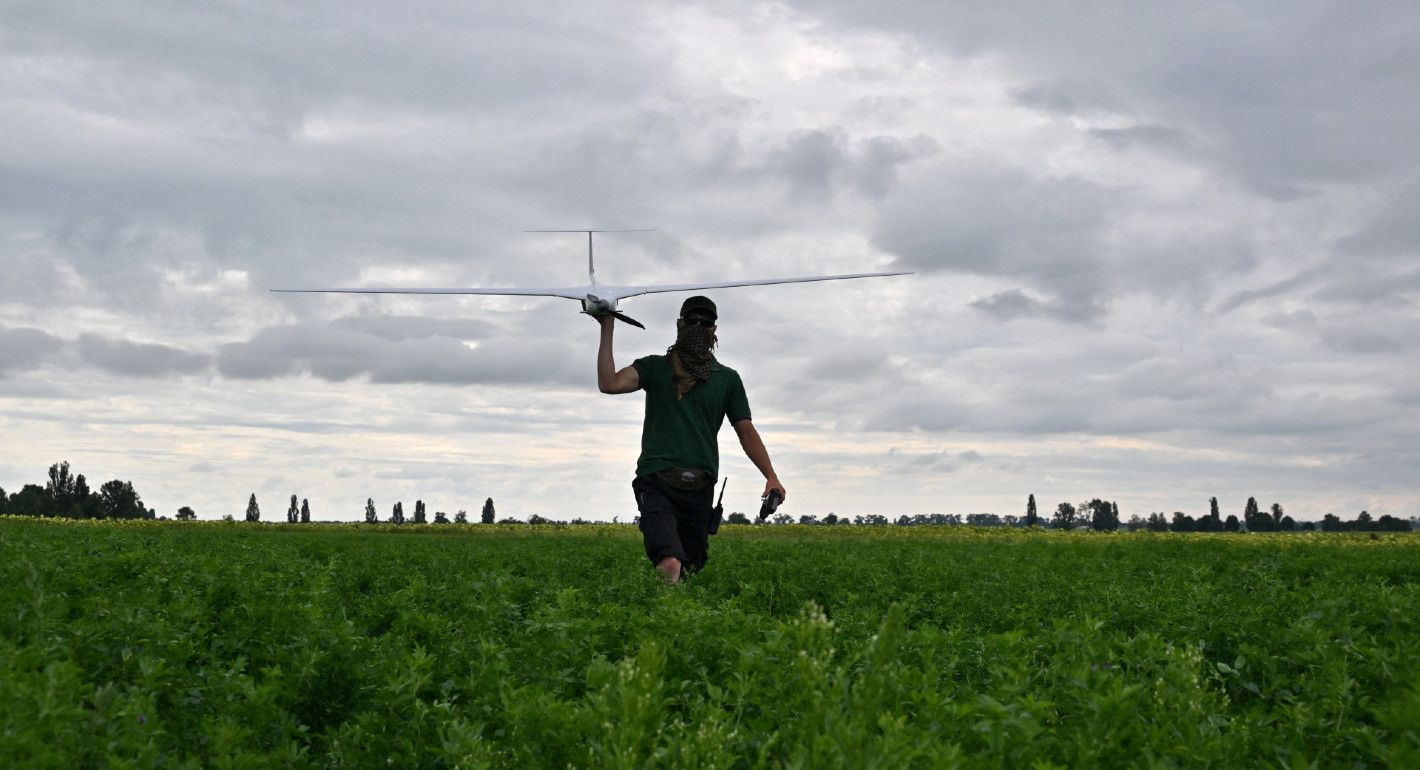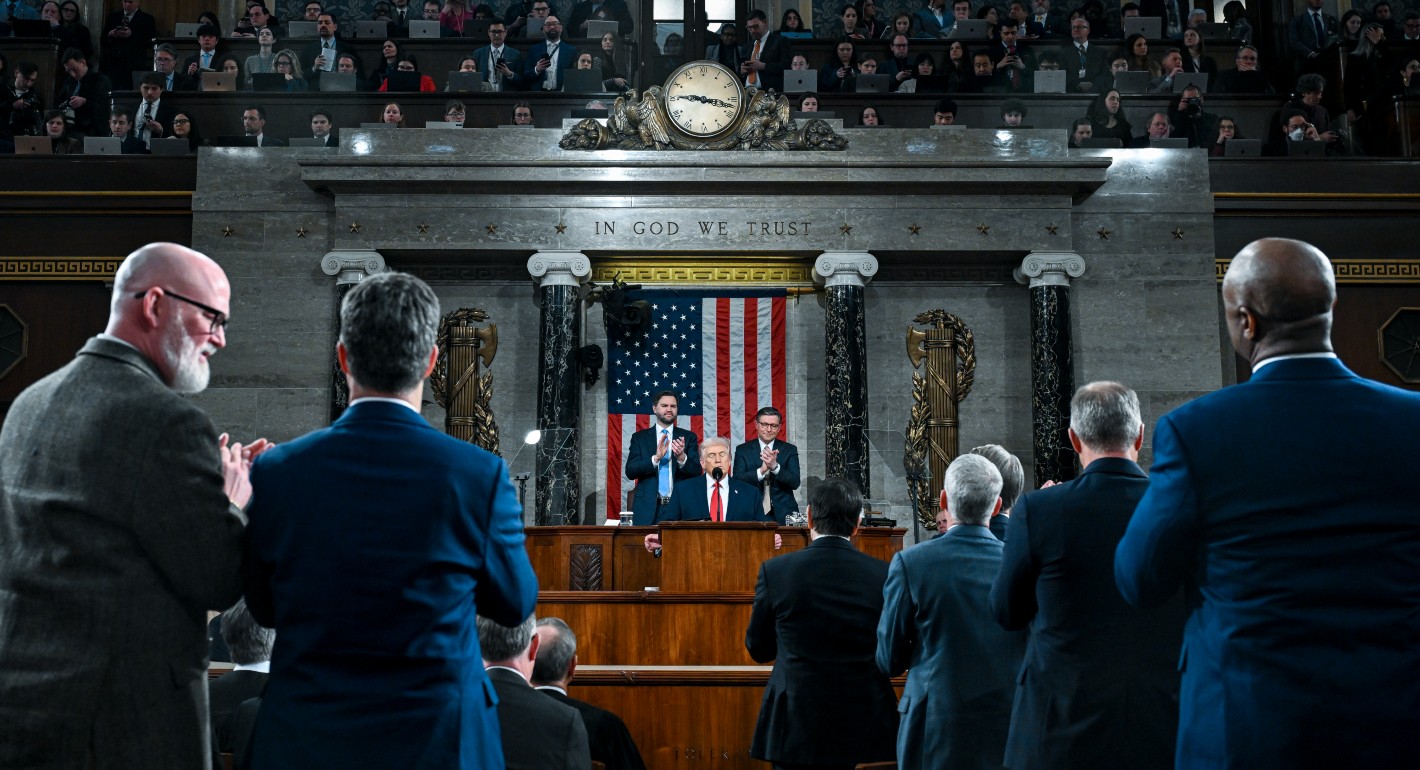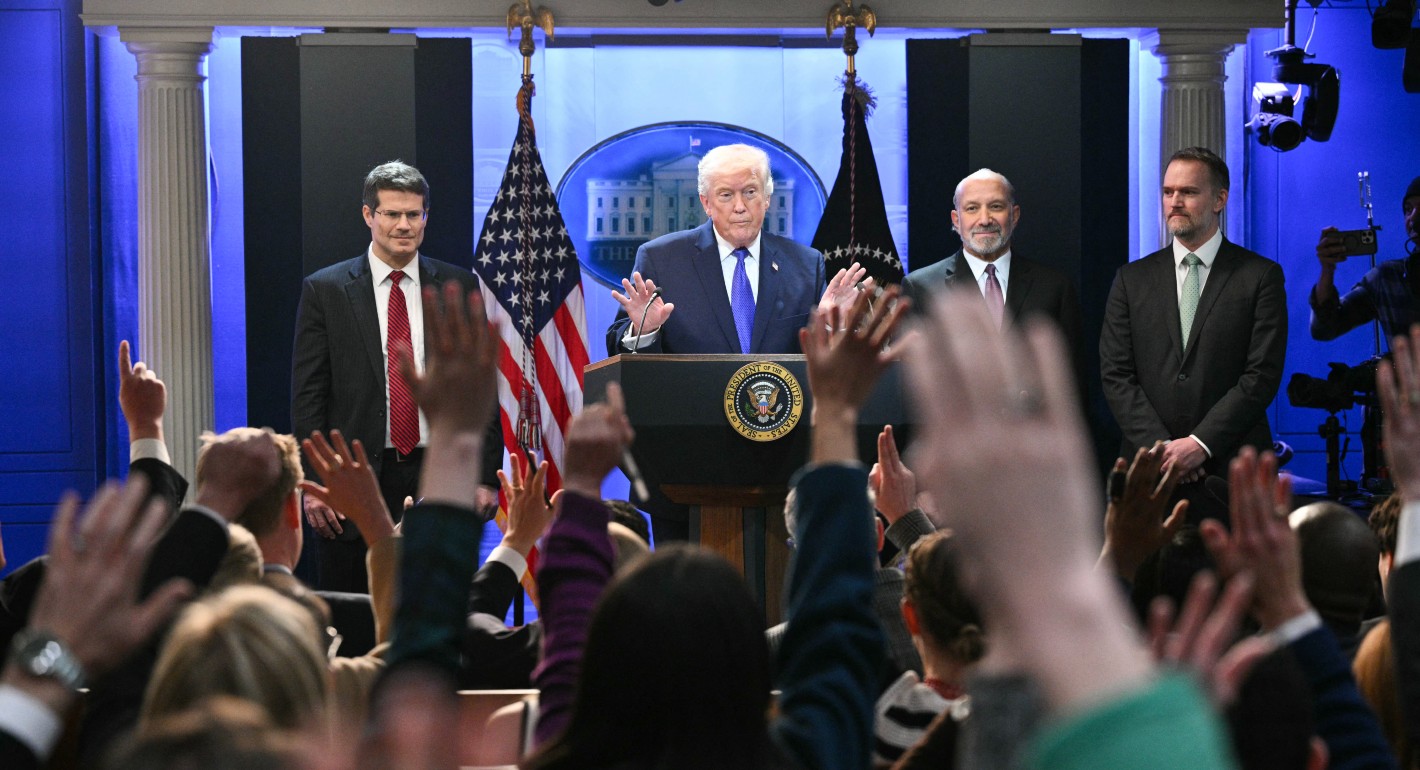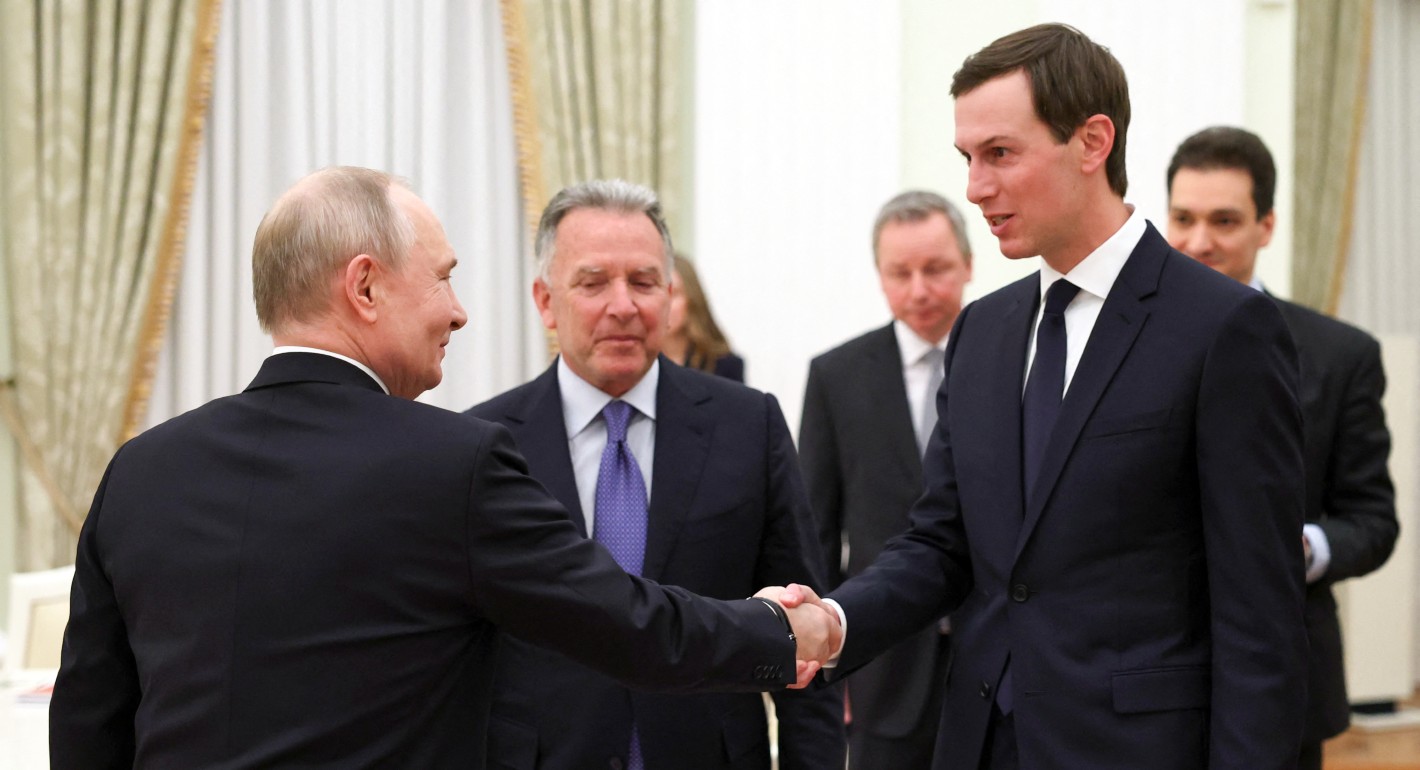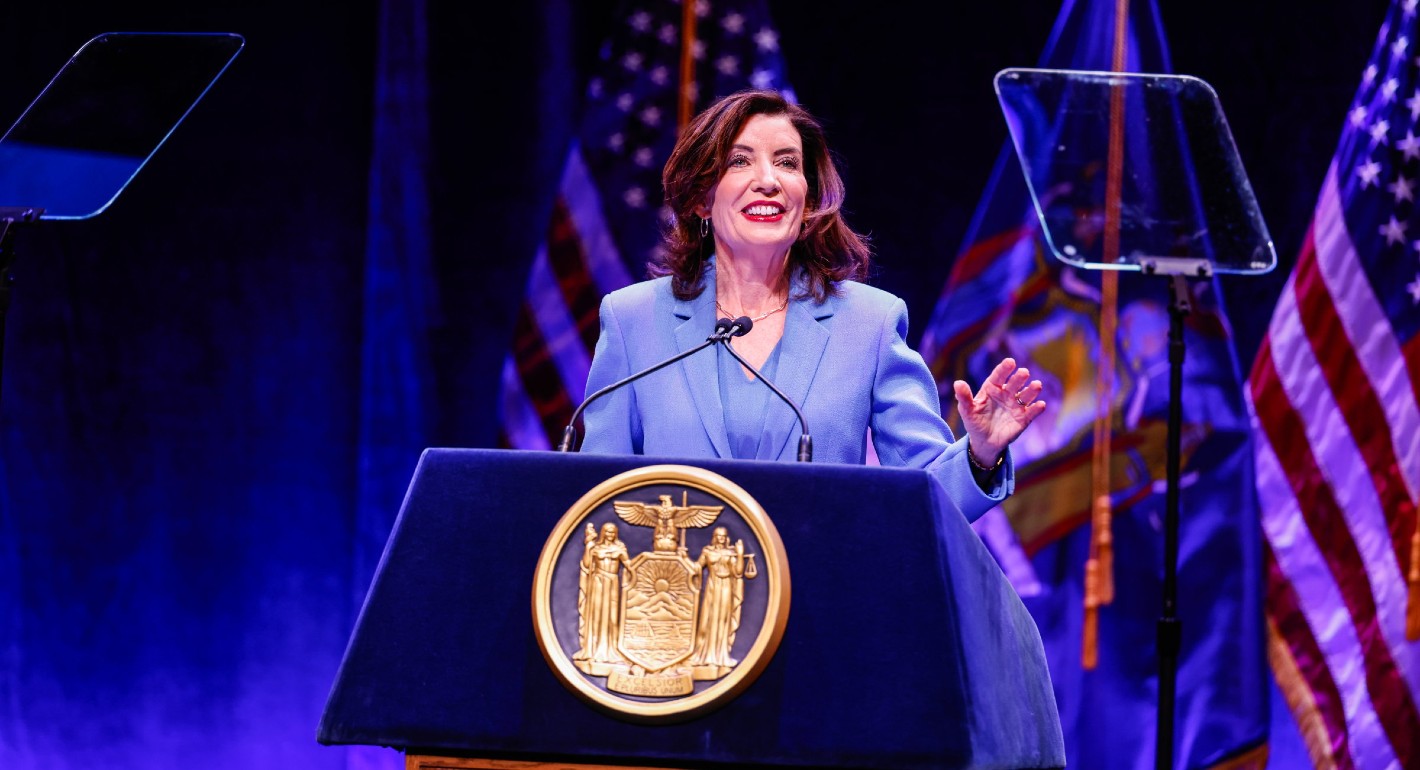By ensuring that Russia’s war is operationally pointless, Ukraine can survive, adapt, and achieve success, no matter how prolonged the war.
{
"authors": [
"Eric Ciaramella",
"Aaron David Miller",
"Andrew S. Weiss"
],
"type": "questionAnswer",
"blog": "Emissary",
"centerAffiliationAll": "dc",
"centers": [
"Carnegie Endowment for International Peace"
],
"englishNewsletterAll": "",
"nonEnglishNewsletterAll": "",
"primaryCenter": "Carnegie Endowment for International Peace",
"programAffiliation": "russia",
"programs": [
"Russia and Eurasia",
"American Statecraft"
],
"projects": [],
"regions": [
"Russia",
"Ukraine",
"United States",
"Europe"
],
"topics": [
"Security",
"Military",
"Foreign Policy"
]
}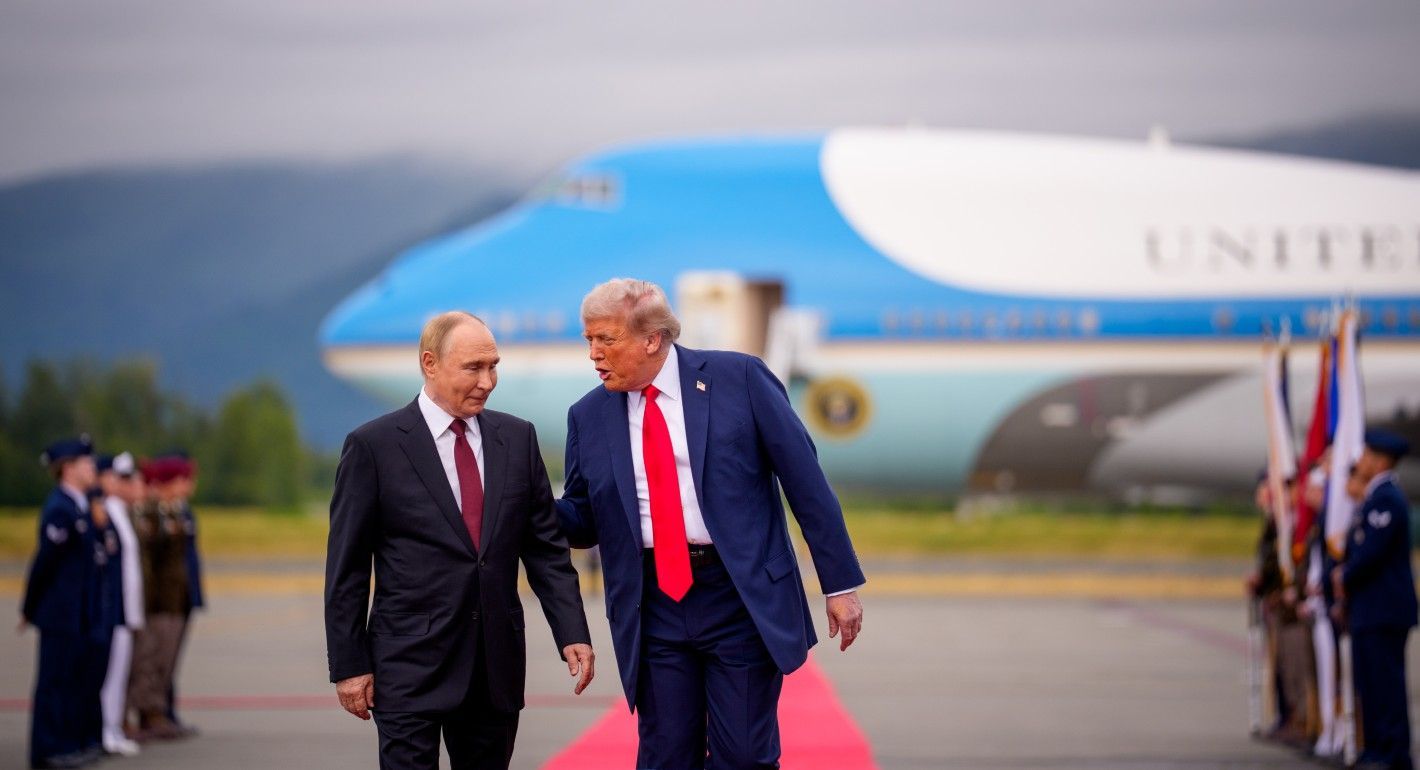
Trump and Putin on August 15, 2025 in Anchorage, Alaska. (Photo by Andrew Harnik/Getty Images)
Is Trump’s Push for Peace in Ukraine a Fantasy?
The president may have the necessary ingredients, but the recipe seems to be lost.
On this week’s episode of Carnegie Connects, Aaron David Miller spoke with Carnegie experts Eric Ciaramella and Andrew S. Weiss on U.S. President Donald Trump’s meetings with Russian President Vladimir Putin and Ukrainian President Volodymyr Zelensky.
Excerpts from their conversation, which have been edited for clarity, are below. Watch the full discussion here.
Aaron David Miller: What happened in Anchorage on Friday?
Andrew S. Weiss: I wish I could give you a bumper-sticker assessment without putting it in a bigger frame. And the bigger frame is that Trump has been trying to put Ukraine on the back burner and get on to some bigger reconciliation or relaunch of the U.S.-Russia relationship since he became a candidate for president in 2016. At every turn, he tries to overcorrect or simplify U.S.-Russian relations, and the reason for that has never been well-defined either by him or members of his administration. Alaska’s the most recent manifestation of that effort.
Every single time Trump tries to say, “Let’s solve the Ukraine problem,” he keeps being hit upside the head by reality, which is that this is a major point of departure in Russia’s relationship with the outside world to launch a war of aggression of this scale. Ending it is not something that’s really in the hands of the United States president unless he’s willing to throw Ukraine under the bus. In Alaska there seems to have been yet another attempt by the Russians to say, “This could all be over really quickly if Ukraine would either surrender territory or agree to give up its sovereignty.” That’s not easy for Ukraine’s leaders to sign off on unless they wanted to commit political suicide. It was yet again one of these moments of false overpromising by the president and his team.
They seem in Alaska to have heard a couple things from Putin that, upon close scrutiny, just don’t check out. One, this is not a war about territory, and if it was just about where you draw the line of control in Eastern Ukraine, this war probably could have been resolved some time ago. Two, the terms of what the U.S. side was portraying as a big Russian concession and that there’s now some new opening for a security guarantee by the United States—that’s just not there as well. And then lastly, the president seems to think that this is a crisis that could be resolved simply by putting people in a room. This is not a situation that is going to lend itself to an emergency set of convenings and be resolved quickly.
Aaron David Miller: What happened on Monday in Washington certainly wasn’t the February 28 catastrophe with Vance, Zelensky, and Trump. It seemed to be a little more substantive and balanced against what happened in Alaska. Is that a fair read?
Eric Ciaramella: I think that is a fair read. I think it’s extraordinary that within twenty-four to forty-eight hours, you had not one, not two, but seven European leaders drop everything they were doing and fly across the ocean to join with Zelensky and press a unified cause to Trump and the White House. I give a lot of kudos to the Europeans for rearranging their schedules to show this, and I think it’s more than the symbolism of it. It really does show Trump that solving this war is not only about getting the two leaders into the room and dealing with Ukraine and Russia and their respective interests. This is a fundamental question of European security, and the fact that they all showed up Monday is a testament to that.
Zelensky negotiated this diplomatic high wire very well. I think he learned a lot of lessons from February 28. Zelensky kept his answers crisp, stayed on message, and didn’t take the bait when members of the press were trying to goad him into saying something that would inflame the situation.
I think it flipped the script a bit from Anchorage, where in the leadup to the Trump-Putin meeting there was all this conversation about territorial swaps. Steve Witkoff kept pressing the idea that ultimately it’s only about these five regions of Ukraine and figuring out what the new map is going to look like. It’s a real estate deal, and that’s it. But I think what the Europeans together with Zelensky managed to show is that the fundamental question is about Ukraine’s long-term security and making sure this doesn’t happen again and figuring out the parameters of that. So they moved the train from one track—which was barreling toward a fundamental disagreement about territory—to one that’s much more productive, about the modalities of Ukraine’s long-term security and relationship with the West.
Aaron David Miller: Are Zelensky and Putin on different planets when it comes to end states here.
Andrew S. Weiss: I wish I knew the answer about where Putin’s irreducible minimum is.
If Putin’s irreducible minimum is full control of Ukraine, this war will go on for a very long time. The people of Ukraine aren’t going to submit to those Russian demands of a total negation of their existence. And there’s been plenty of blood shed that validates that this isn’t just talk or hot bravado on the part of the Russians. They are actually working to grind Ukraine down and make that a reality.
If this is something that is a negotiation, and I’m not persuaded that it is, I don’t think we’re anywhere near that. The Russians don’t believe that the current course they’re on won’t lead to what I just described. I think they believe Ukraine may collapse. They believe that Western support could peter out. They believe Trump may suborn Ukraine into some version of what I’ve just described. So from their perspective, the more they just keep on keeping on, they may get this accomplished.
There is a version of this that is more negotiated that think tank people write about. It requires a very complex set of arrangements and a Russian recognition that the war path they’re on will not pay off in the end. I haven’t seen that light bulb go off in Putin’s behavior—based on his actions, he doesn’t think he’s going to fail here. The U.S. being an unpredictable supporter of Ukraine feeds that confidence.
I know I’m not answering your question, Aaron. If Ukraine were to accept the current line of control, that there won’t be further Russian territorial encroachment, that there will be a robust Western security package for Ukraine that allows it to build a strong military that has a serious deterrent, as well as a Western commitment to provide reinforcements in the event of a new wave of Russian aggression at some point down the road—if all these kinds of things are on offer and the U.S. is going to bankroll it, and there’s going to be serious European commitment to make real, then yeah, maybe that’s where the thing lands. But we’re not in that universe right now.
Aaron David Miller: What would be required to begin to change Putin’s conception of what he wants in Ukraine?
Eric Ciaramella: I think it depends in large part on how far the United States and Europe are willing to go. It has been consistent between the previous administration and the current administration that the United State is not willing to send ground forces into Ukraine to force some kind of military end of hostilities. So it leaves some pretty imperfect solutions.
The best one I’ve seen so far is from Andriy Zagorodnyuk, a nonresident scholar in our program and the former defense minister of Ukraine. He argued that Ukraine and its partners need to stop assuming that they can do anything to change Putin’s calculus—that some form of armed standoff is going continue in perpetuity. Zagorodnyuk calls for a series of functional defeats, where domain by domain in the military arena—air, land, sea, cyber, so on and so forth—you amass and deploy the capabilities needed to blunt Russia’s ability to use its own tools in order to further its political objectives.
We saw that happen in the Black Sea. Ukraine doesn’t have a navy. Russia had a very powerful fleet, based in Crimea, whose original objective was to blockade and then launch an amphibious assault against Odesa and seize the entire Ukrainian coastline. What Ukraine was able to do, with the use of very innovative undersea drone warfare, was essentially push the Russian fleet out of the western Black Sea and back to the Russian coast. The naval war has reached a point where Russia can’t really deploy its assets in any meaningful way against Ukraine.
So what Zagorodnyuk talks about is using these building blocks to get to a point of strategic neutralization—that’s the term he uses—where basically Russia keeps waging war; it doesn’t forswear its objectives; it never agrees to any peace; but it keeps banging its head against a wall, and it doesn’t achieve anything. And I think that’s probably the best-case scenario we can hope for, because I think changing Putin’s calculus under the current scenario with the current level of Western political will is just not in the cards.
Aaron David Miller: We now have two aspirational breakthroughs planned. The first is a Putin-Zelensky meeting, and the second is a trilateral. As a nonexpert in these matters but as someone who knows a little about negotiations, I cannot understand what their point is.
Andrew S. Weiss: Aaron, you’re thinking too hard about it.
Ever since that horrible meeting in the Oval Office, the Ukrainians have been working as best they can to avoid being blamed for the diplomatic gambit not succeeding. They worked very closely with the Europeans to be portraying themselves as big supporters of the gambit, wanting to help Trump win the Nobel Peace Prize, and being super grateful for the incredible leadership of the United States. They’ve done that, I think, quite effectively.
Earlier in this saga, Trump said there needed to be a Putin-Zelensky meeting, and Zelensky was the first to say, “I’ll be there.” That’s what we’re witnessing again: a sort of gambit to show that it’s Putin who doesn’t want peace and that the Russians are going to pile on conditions as a prerequisite for any meeting. The reality is Putin won’t meet Zelensky unless he’s there to surrender.
I think this is an elegant way of showing that there’s no receptivity in Moscow for a serious effort to make peace with Ukraine unless it’s on Russia’s terms. At this point, that’s not going to happen. Ukraine is not on its knees, and it’s not desperate. They’re worried, and things are not looking good, but they would rather just keep going, even if the long-term picture is not very encouraging, than settle at the current moment.
One of the things that Trump heard from Putin in Anchorage was: “I’m going to get all the stuff I want anyway, so why not give it to me now and avoid the loss of life that’s likely to result in the interim?” That has been one of Russia’s most persuasive messages to this administration. I think Ukraine’s friends in the West need to hear that and really ponder what they can do to make Russia start to question that calculus.
Aaron David Miller: So the bilateral meeting is a gotcha game?
Andrew S. Weiss: I wouldn’t say it’s a gotcha game, but I think it’s saying, “We need to test the Russians,” so the first test of sincerity would be a bilateral meeting going between Putin and Zelensky. And if they’re throwing out things like Russian Foreign Minister Sergey Lavrov insisting that Zelensky cancel various laws that Russia claims are discriminating against the rights of Russophone populations inside Ukraine, Russia won’t deal with him. The Russians are not eager to see Zelensky.
Aaron David Miller: But they might come.
Andrew S. Weiss: No. I think it’s very low probability. I’m wrong about everything, Aaron, but I’m really skeptical that Putin will meet with Zelensky anytime soon. And German Chancellor Friedrich Merz is saying this needs to happen in the next two weeks. I find that unthinkable.
Aaron David Miller: There’s no domestic problem for Zelensky sitting down with Putin and achieving nothing, because he needs to please Trump, and Trump becomes more important than the blowback that Zelensky might get from such a meeting that doesn’t produce a ceasefire or an end to the violence or anything that he can show for it?
Eric Ciaramella: I think Ukrainians have become very sophisticated observers of the international game over the past three and a half years and are quite cynical about the motivations of different partners. And I think they’ve come to understand that the United States under Trump is putting enormous pressure on Ukraine and that their president needs to find a way to not be the obstacle and creatively maneuver around these different pitfalls. They give him quite a lot of space to pursue what he argues is necessary in the international domain.
Aaron David Miller: Are you surprised that people were actually talking about the issue of security guarantees in something that represented coherent fashion?
Eric Ciaramella: Coherent is probably an overstatement in this case, but at least consistently talking about it.
I think the problem is that everyone has a different understanding of what a security guarantee would mean for Ukraine. You’ve heard this very strange formulation—which started with the Italian prime minister, then you had Steve Witkoff and Trump saying it—something like Article 5 that isn’t Article 5 and would not involve the direct intervention by the parties.
I’ve been trying to puzzle through what that could actually mean, because Article 5 of the North Atlantic Treaty, while it is vaguely worded, has a very clear understanding that has been created through seventy-plus years of really close alliance work: If the territory of a NATO ally is attacked, all the other ones will come to its defense.
How is that more than just words on a paper? It’s because there’s constant meetings from ministers down to the staff levels. There are contingency plans. There is a process of military coordination. They have deployed together in Afghanistan and elsewhere. There is a very clear understanding that NATO would operate together as a military alliance to defend any ally. If you take that part away from it, what is left? I don’t understand.
Not to be silly, but this reminds me of my little sister when she was a toddler, and she would ask for a hot dog without the red thing in it. And, bread is nice, but if you don’t have the hot dog in it, it’s not a hot dog anymore. So Article 5, without a commitment of U.S. military intervention or the intervention of these European military powers, I fundamentally don’t understand what it is. I hope that Marco Rubio and the other European national security advisors can really hammer out what this is.
Could you envision a European military contingent that has some kind of training mission and reassurance mission? Let’s say it goes into Ukraine and the U.S. military provides some amount of air cover and enablers, intelligence support, logistics, so on and so forth. It’s not a security guarantee in any classical sense. It’s something else, maybe ceasefire monitoring. If you package it with some kind of long-term, predictable supply of weapons to the Ukrainians to help them build the army that they’re going need to defend and deter, you start to get into something that is concrete. Again, it doesn’t look like a classical security guarantee, and I wish people would not use that word—it cheapens our other security guarantees, which are enshrined in treaties.
That’s another issue we haven’t talked about: Congress. If the president is prepared to give another country something that is tantamount to pledging that we will be a party to the war in the future, that needs to go through Congress.
Andrew S. Weiss: The enemy always gets a vote, right? The Russians have been very, very explicit that Ukraine’s not going to have Western troops on its territory and that it’s not going to have continued Western military and intelligence cooperation. They’ve shown no give on those things. So the idea that Putin may have said something that was misinterpreted in Anchorage, and then people ran around saying, “Look, this is a new Russian concession”—that’s all totally unfounded.
What the Russians have put on the table is that there would be these security guarantors. It would look something sort of like UN Security Council plus, and that Russia would be among those guarantors. And it would retain a Russian veto in terms of what kind of response is mounted in the event of a new crisis. It’s not a serious security guarantee. It’s a Russian ploy to retain control over Ukraine.
Aaron David Miller: We haven’t even talked about what the quid pro quo would be or Russians even entertaining any sort of meaningful security guarantee. And that gets down to the issue of territory, correct?
Andrew S. Weiss: This is not about territory. Putin wants a puppet regime in Kyiv that does not have intelligence and military cooperation with the West. If this were a question of “Can I have Donbas, and I’ll give you the line of control in Zaporizhzhia and Kherson?”—which is the notional offer on the table—but that’s just not what this is. He wants Ukraine to collapse and fall back into Russia’s embrace.
Eric Ciaramella: If we look back at the negotiations early in the war in Istanbul, we see the terms of that quid pro quo: this cockamamie P5 security guarantee formulation, which Russia was demanding a veto over, which is absurd, in exchange for Ukraine agreeing to a very severe form of military neutrality.
I want to disabuse [readers] of the notion that this offer was something like Swiss nonalignment and neutrality, where they have their own credible defense and deterrence, but they just weren’t part of any alliance. What Russia was demanding here was a complete severance of all of Ukraine’s security relationships with partners and an army that would be a token force that would be run over in the first second of a new invasion. It wasn’t about installing a puppet regime explicitly, but about creating the circumstances where Ukraine would be so weak that Russia could coerce it into doing whatever it wanted. That, to me, is not a reasonable quid pro quo. And until the Russian leadership realizes that these more sweeping objectives are simply impossible—and I have no idea what it will take to get that through Putin’s head—then you don’t have a deal.
Aaron David Miller: On vacation, I’ve been watching a lot of Seinfeld reruns. I keep thinking about [the Trump-Putin and Trump-Zelensky meetings] and that it must be a serious effort. And then I think about the brilliant notion of producing a show about nothing.
Andrew S. Weiss: I’m not sure I buy the Seinfeld thing. This is all deadly serious.
The Russians have been hoping that they could plant a wedge between the United States and Europe, and United States and Ukraine. Putin was largely successful in doing that with the proposal he gave to Steve Witkoff a little under two weeks ago. There are real serious ripple effects of all of this. There has been a very uneasy new equilibrium created between the United States and Europe over who’s going to do the heavy lifting on supporting Ukraine. It requires a level of U.S. cooperation in the Pentagon bureaucracy and other parts of our system to make the new underwriting by Europe an effective mechanism. The government has been largely hollowed out over the past six months of the expertise that’s required to implement those kinds of arrangements.
It’s a war, and it’s really dynamic. The president was reminded at the most recent juncture of the Ukrainian special operation to attack Russian strategic air assets that Ukraine has cards here. It’s not going well for Ukraine, but the Russians are not rolling over them right now. There’s a lot of need here for real understanding about what a grinding war means, why it’s not good for Ukraine, and why even if the current policy that Eric and I see taking shape before Anchorage is implemented, it still may not be enough to save Ukraine. That is still a very real policy problem, and we should not pretend that fending off Trump’s diplomatic forays is going to prevent that outcome from occurring.
Eric Ciaramella: I won’t be one to criticize Trump for using his energy to wade into this. Diplomacy is good and necessary, and keeping the focus on what the Russians are doing and how we figure this out is needed. Even though there were some images from Alaska that made me uncomfortable—and it was definitely premature, on the whole—it was probably not the worst idea for there to be leader-level contacts between the United States and Russia.
I believe that Trump has the recipe and the ingredients in his pantry to shift what is a war that is not going well for our interests or for Ukraine’s future into something that is more sustainable and has the chance of not ending disastrously for European security. The problem is that the recipe is lost somewhere, and he doesn’t seem to be doing much work to figure out the right quantities and the right order in which to do this.
I hope that in the coming weeks, there will be a little bit of reflection at the lower levels in the administration to say, OK, we now have everyone’s attention, and we have a huge amount of sway with all the parties. Now we need to organize our work in a way that makes sense so that we actually nail down some of these details and then bring it back to leaders.
I do have a little bit of hope that we could end up in a better place than we are right now, but firing in a bunch of different directions and hoping that people get in a room and shake hands and everything magically goes away is fantasy.
Use the player below to listen to the whole conversation, or watch it on YouTube.
Invalid video URL
About the Authors

Senior Fellow and Ukraine Initiative Director, Russia and Eurasia Program
Eric Ciaramella is a senior fellow in the Russia and Eurasia program at the Carnegie Endowment for International Peace. His work focuses on Ukraine and Russia.

Senior Fellow, American Statecraft Program
Aaron David Miller is a senior fellow at the Carnegie Endowment for International Peace, focusing on U.S. foreign policy.

James Family Chair, Vice President for Studies
Andrew S. Weiss is the James Family Chair and vice president for studies at the Carnegie Endowment for International Peace, where he oversees research on Russia, Ukraine, and Eurasia. His graphic novel biography of Vladimir Putin, Accidental Czar: the Life and Lies of Vladimir Putin, was published by First Second/Macmillan in 2022.
Carnegie does not take institutional positions on public policy issues; the views represented herein are those of the author(s) and do not necessarily reflect the views of Carnegie, its staff, or its trustees.
More Work from Emissary
- Indian Americans Still Lean Left. Just Not as Reliably.Commentary
New data from the 2026 Indian American Attitudes Survey show that Democratic support has not fully rebounded from 2020.
- +1
Sumitra Badrinathan, Devesh Kapur, Andy Robaina, …
- Trump’s State of the Union Was as Light on Foreign Policy as He Is on StrategyCommentary
The speech addressed Iran but said little about Ukraine, China, Gaza, or other global sources of tension.
Aaron David Miller
- How Middle Powers Are Responding to Trump’s Tariff ShiftsCommentary
Despite considerable challenges, the CPTPP countries and the EU recognize the need for collective action.
Barbara Weisel
- What If Trump Gets His Russia-Ukraine Deal?Commentary
It’s dangerous to dismiss Washington’s shambolic diplomacy out of hand.
Eric Ciaramella
- With the RAISE Act, New York Aligns With California on Frontier AI LawsCommentary
The bills differ in minor but meaningful ways, but their overwhelming convergence is key.
Alasdair Phillips-Robins, Scott Singer

